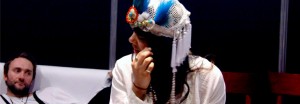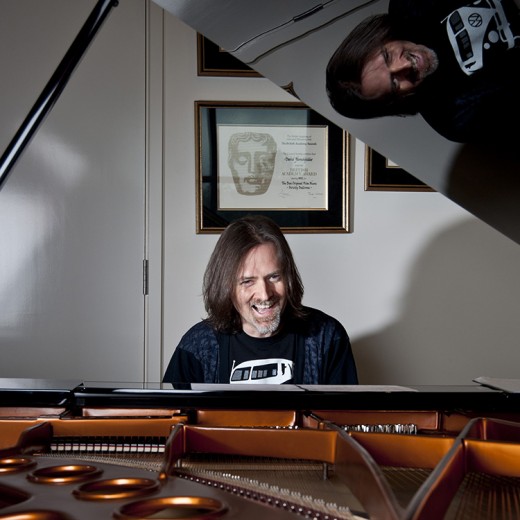Blog Menu
The Music and Sound Design of Breaking Bad – Dave Porter interview
The Music and Sound Design of Breaking Bad – Dave Porter interview
By Soniccouture | 22.02.2013
Breaking Bad is one of the most acclaimed TV drama of recent years – Dan (a massive BB geek) spotted our Balinese Gamelan instruments in the soundtrack, and caught up with composer Dave Porter for a chat ..
Read More
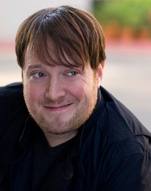 Congratulations on being a part of what is probably one of the best TV dramas we’ve ever seen. It must be wonderful to be part of such a strong team. Can you take us through a typical episode’s production process? How long does it take?
Congratulations on being a part of what is probably one of the best TV dramas we’ve ever seen. It must be wonderful to be part of such a strong team. Can you take us through a typical episode’s production process? How long does it take?
Thank you very much – I’m glad that you’re enjoying it. I am fortunate to get to work with such an amazingly talented group of people. In terms of our production process, we usually mix a show every week. I get the episode roughly two weeks before that, so I’m working on two at a time. The cycle starts with a spotting meeting in the editing room, which generally includes Vince Gilligan (creator and executive producer), the writer(s) of the episode, the picture editor, our sound and dialogue team, our post-production supervisor, our music supervisor, our music editor, and me. We painstakingly go through the entire episode, which is usually complete at that point, and talk about the sound and music for every scene. We discuss where music should be, and equally importantly, where it should not. And if there is going to be music, what it should achieve and whether it should be score or source. To me, this meeting is the most important step in the process.
After that, I spend a few days writing cues in my studio. I deliver them to Vince as QuickTime movies, and he gives me feedback. I spend a day or so polishing things up and then it’s time to repeat the cycle with the next spotting session. While writing for the next episode, I’ll also be mixing each of my cues from the previous one again from the ground up to prepare them for the mix stage. In addition, I always attend the final mix playback for each episode.
You obviously use a lot of unusual sounds in Breaking Bad. Are you making a deliberate effort to avoid scoring for traditional instruments?
Yes. Although I am classically trained, I knew from my first viewing of the pilot episode that a traditional score would be the wrong choice for Breaking Bad. Nothing about the show is expected, and I felt that the score needed to reflect that. There have been only a handful of times that I’ve incorporated a traditional western orchestral instrument, and when I have, it’s been processed into something quite different.
We noticed the Soniccouture Balinese Gamelan in Breaking Bad season 4. Are there any other Soniccouture instruments you’ve used?
Yes, since the beginning I’ve employed a lot of Asian instruments as a backdrop for Walt, because it seems so unexpected and out of place in Albuquerque. (And Walt, of course, is usually way out of his comfort zone.) I’ve also used the Soniccouture Omnichord samples and DDR Toy Piano. And since I’m always looking for new and interesting ways of performing the show’s theme for the end credits each week, I’ve been eyeing the Ondes Martenot instrument… maybe in season 5!
There’s a certain vagueness to the Breaking Bad scores that seems to blur the line between music and sound design. We assume this is intentional. What kind of sounds are you drawn to?
It is definitely intentional. The score grows organically out of the natural sound, and vice versa, to create a seamless audio backdrop. To this end I often request snippets from the production sound (such as clocks, locusts, and lab equipment noises) to use as fodder for sound design that I include in my scores. I also create my own samples using audio I capture with a small field recorder.
The only music that seems to stay the same each episode is that short Dobro sting under the title. Did you play that yourself?
I write a new score for the end credits each week, so yes, the show’s opening theme is the only constant. While I sketched out the original resonator guitar part using samples, the final version was performed by a professional guitarist because I’m a pretty poor player. It’s something I’m working on though!
While you obviously use a lot of samplers and technology to create sounds; is there some amount of the soundtrack that is acoustic? If so, about how often do you go acoustic? What kind of instruments? And do you process the acoustic instruments as well?
A lot of the score for Breaking Bad begins its life as “acoustic” in the sense that it was recorded with a microphone, but absolutely everything that gets recorded for the show is later processed. And when I do use something from a sample library, it usually gets treated, too. I try to record as many live performances as our budget and timeframe allow, which includes recording sessions that I do during the off-season to build up my arsenal of ideas. For example, prior to last season I recorded an expert on early winds and reeds that I knew would come in handy, as well as an amazing Quena (Andean flute) player that I felt would be useful for Gus. I also record myself a lot—whether I’m simply banging on kitchen or garden tools or playing one of the instruments that I own. For example, the instrument that always accompanies Walt when he dons his “Heisenberg” hat is a Japanese koto, which I play, record, and then process. I also have large libraries of recordings of my vintage synthesizers… I spend‘spare’ time tweaking and programming them while the DAW records everything, and then I extract the best bits for later use. By the time I am mixing a cue I’ve printed everything— even software synths— because I’m likely to end up processing it anyhow and I never want to get caught going back to a session from a few years back and realizing that some softsynth that is now in version 7 doesn’t remember a patch from version 2.
Do you have a musical education, or are you self taught?
I started classical piano at age 5, and I studied composition and orchestration at Sarah Lawrence College in New York. My knowledge of synthesizers and recording techniques is largely self-taught, although I was fortunate to study under composers who were forward thinking and open to incorporating those kinds of tools.
Can you give us a geeky list of some of your favourite bits of technology (hardware or software) ?
I use a mix of old and new hardware and software. While I sometimes use software synthesizers, the vast majority is still hardware because I find they sound better and they’re more inspiring creatively. On the flip side, I use software extensively for samples and all manner of digital processing, because nothing can match it for power and creative options. On the software side I spend a lot of time with Kontakt, and have a small army of plug-ins for distortion, bit-crushing, and compression. In terms of hardware outboard I still use a Lexicon PCM-42 delay— mine has been modified with a reverse switch and extra delay time—and I’ve got a great old Korg gated spring reverb. My synthesizer collection has gotten quite large. Some favorites that have seen action recently on Breaking Bad include my ARP 2600, Oberheim Matrix-12 and Ob-Mx, Roland MKS-80, Sequential Prophet VS, and a Voyetra-8.
Is Vince Gilligan (Breaking Bad’s creator, writer, director) heavily involved in the soundtrack production process? Does he have strong opinions about what kind of music is used ?
Vince is involved in every aspect of the show, including the music. While he isn’t likely to make specific musical recommendations, he is keenly aware of what works and what doesn’t, and always has his eyes on the big picture. He listens to and incorporates everyone’s ideas, and when it comes time to make the tough decisions, he is decisive. Honestly, some of the toughest music related decisions on Breaking Bad come down to a great piece of score or source versus no music at all… because the scripts and performances in the show are already so strong.
In season 2, there’s a Spanish song that refers to “Heisenberg”. Were you involved in the writing and/or production of that song ? (It’s a brilliant band, btw, but we don’t speak Spanish.)
That’s “Negro Y Azul: The Ballad of Heisenberg.” This was an instance where nothing would do but an authentic band that was devoted to the art of creating Narcocorrido, which are Mexican drug ballads. (These are real and controversial songs that are often commissioned by drug lords to celebrate their success.) Our music supervisor, Thomas Golubic, found the band (Los Cuates De Sinaloa) and oversaw them as they wrote the song based on lyrics written (in English) by Vince Gilligan. I got to sit back and enjoy that one from the back of the room!
I do, however, enjoy the occasional departure from my usual score duties. I got to write a humorous thrash-metal track for Jesse’s fictional band, I’ve scored a number of Saul’s hilarious tv commercials, written music for video games which appear in the show, and even created some of the cell phone rings, including the memorable one that is used as Hank’s ringtone for when Marie is calling in episode 306 “Sunset.” I love these challenges, because unlike the score—which has a macro focus—these moments are often plot devices written into the script that have an immediate effect.
Is it slightly confusing to work on a show where the characters are so complex? It seems there’s no good guys or bad guys.
That is definitely the most challenging aspect of scoring the show. I work hard not to let the music lean too obviously toward either heroic or villainous, as there is no such thing on Breaking Bad.
There’s an interesting aspect to Walt’s character development through the 4 seasons we’ve seen so far. In the beginning we sympathize with Walt, but as the series progresses his character seems to turn (as the show’s title suggests). Is this evolution of his character something you can portray with the music? Is Walt becoming the bad guy?
Walt’s journey and descent is the spine of the show. Over the course of several seasons he has gone places that seemed unimaginable at the outset. What is most fascinating to me, and I try to always remember as I’m writing the score, is that how far one is willing to sympathize with Walt reflects entirely back on the viewer. There are people who were horrified by his behavior in the very first season. There are others who will defend him no matter what he does. In this way, Breaking Bad demands that you notice your own reaction to the story you are witnessing. And to me, musically speaking, that means that I will never highlight one specific moment as a “Breaking Bad” moment… because it’s been a gradual evolution (or devolution) over the course of the series, and everyone’s perception of the tipping point is different. One example is the moment in season 4 when Walt is in the airport parking lot after the demise of Gus. On another show, that would have been a classic musical moment… but ultimately, we went entirely without music and just had him listening to the news on the radio… because any music that you put in that moment would tilt the audience’s reaction one way or another, and Vince very much wanted it to be ambiguous. After all, you could easily argue that the lesser man had just won.
On the other hand, Jesse’s character remains slightly innocent, we always kind of feel for him. How does that influence the music used in his scenes?
I think it is fair to say that Jesse is the moral center of the show, or as close to one that Breaking Bad is going to have. To that end, yes, there is always a touch more warmth when I’m writing for Jesse, and musically his evolution has been a few steps behind Walt’s. Jesse certainly had made many poor decisions, but he is also the victim of some dreadful ones made by Walt. I’m excited to see where they will all end up at the show’s conclusion!
For more info, visit Dave’s Facebook page :
https://www.facebook.com/pages/Dave-Porter/150020628425348
Close CloseThe Live Sound of Bat For Lashes: Ben Christophers Interview
The Live Sound of Bat For Lashes: Ben Christophers Interview
By Soniccouture | 29.10.2012
Bat For Lashes’ new album ‘The Hunted Man’ is garnering critical praise from all angles ; we talked to musical director Ben Christophers about some of the sonic tricks he uses to get the sound, and how Soniccouture instruments fit into the production.
Read More
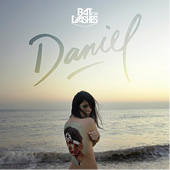 You & Natasha are big fans of Novachord; how does it fit into the Bat for Lashes live production?
You & Natasha are big fans of Novachord; how does it fit into the Bat for Lashes live production?
” We have been using Novachord a lot especially for live work, it has some of the most expressive sci fi, David Lynch-like sounds that are the best for creating the atmosphere we want, but also add great depth, the string sounds were the first thing that struck me, I love the slow attack of some of them which I use on songs like Daniel from ‘the Two Suns’ Album. The Organ sounds are straight out of Eraserhead and quite chilling, the Novachord gives me the reality of the sound and the scope to effect it within the realms of the real thing, the more I’ve got to know it the more I’ve appreciated it, the history of this instrument is great and still largely unknown so there is a mystery that surrounds it which appeals to me.”
What is the usual production process with Natasha? Are you generating musical ideas for her to write around, or does she begin ideas which you then help develop?
“There is no form at any time, apart from the emergence of the songs which is the bottom line, I am the MD for the band and also I’m involved with the recording process and every time it is all totally unpredictable which I really like,. On the Two Suns album we got to support Radiohead before the album was finished and this had a major impact on that record as we got to play to huge audiences on a massive stage for about a month and develop the sound before recording it, it’s a great way of doing things as the songs come into their own after a while and you get a wider sense of what can be done no rehearsal room can give you that.”
Can you name some of your most loved pieces of gear, and hazard a guess at what the magic ingredient is?
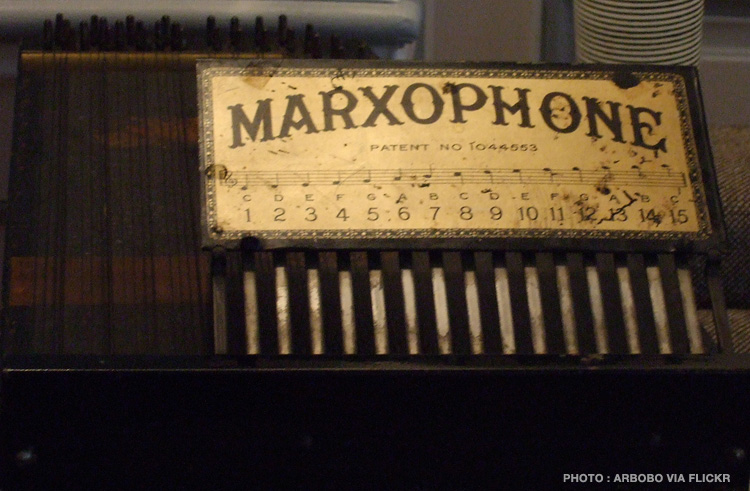 “I don’t know where to start, I guess one that has been a huge influence on the band and me as a solo artist is ‘The Marxophone’ also something else I use to make the most ominous and haunting string sounds is something called a ‘Phonofiddle’ the magic ingredient with them is the otherworldliness they bring, utterly indescribable sounds and captivating. Recently I have been getting into analogue synths and have fallen in love with a Roland SH1000 (pictured), 1973 just as electronic music was beginning to see the light, the sounds are innocent and strong, so reactive and so complete I love it.”
“I don’t know where to start, I guess one that has been a huge influence on the band and me as a solo artist is ‘The Marxophone’ also something else I use to make the most ominous and haunting string sounds is something called a ‘Phonofiddle’ the magic ingredient with them is the otherworldliness they bring, utterly indescribable sounds and captivating. Recently I have been getting into analogue synths and have fallen in love with a Roland SH1000 (pictured), 1973 just as electronic music was beginning to see the light, the sounds are innocent and strong, so reactive and so complete I love it.”
When producing a song or record for someone else, do you let the sound evolve; taking itself in whatever direction it goes during the process, or do you tend to visualise/’auralise’ a sonic aesthetic when you first start work on it? If so, how rigidly do you stick to the vision?
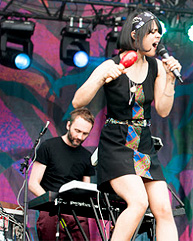 “I have a sense of the overall sound, can be imagery or even a film before I start work on it, but I almost always waiver and sometimes realise that was just part of the process and my perception was merely the whole thing in it’s infancy, but my influences have a hold on me I hope in a good way and I have strong bench marks and processes I go through that often beat me up for a long time but are all pennies to throw in the well while I put it together.
“I have a sense of the overall sound, can be imagery or even a film before I start work on it, but I almost always waiver and sometimes realise that was just part of the process and my perception was merely the whole thing in it’s infancy, but my influences have a hold on me I hope in a good way and I have strong bench marks and processes I go through that often beat me up for a long time but are all pennies to throw in the well while I put it together.
Last year I worked with an Artist called ‘Cold Specks’ and it was obvious her “Doom Soul” sound was going to involve church bells and marxophones and anything else I could find in my weird spaceship, watching that album unfold was a great experience.”
What is it about Soniccouture instruments that appeals to you?
“The basic sounds without a doubt, the eclectic choice is something else I’m really drawn to, the imagination of the tweaking options is great too, I am really enjoying Morpheus at the moment as we are using that live on a few things it has such a mystery to the sound, I know it sounds a bit nerdy but one thing I really like is the detail and care on the site that shows how you went about making these samples.”
What is your philosophy towards sampled / virtual instruments? Do you prefer to use ‘real’ instruments and hardware gear where possible, or do you enjoy the flexibility of working in the box?
“I don’t think I could ever get the same feeling or reactions I do from the other side of my music which is analogue / acoustic and the more eccentric instruments I use, for me virtual instruments are a different way of working, mixing all the technologies is cool and I try to have an etiquette with the virtual world as it’s very easy to get emmersed in it and end up not really making anything new.”
Close CloseDavid Hirschfelder on Film Scores, Samples and Zen Detachment
David Hirschfelder on Film Scores, Samples and Zen Detachment
By James Thompson | 21.11.2011
David Hirschfelder is one of the world’s most sought-after film composers, whose scores include Strictly Ballroom (1992), Shine(1996), Sliding Doors (1998), Elizabeth (1998), Hanging Up(2000), Peaches (2004), Australia (2008), and recently Sanctumwith James Cameron.
Read More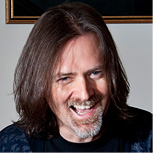 David collaborated with us on The Conservatoire Collection, beta-testing and lending his talents for a great demo track, Rondeau A La Fondue. We took the opportunity to chat with him a little bit about life on Hollywood’s production A-list.
David collaborated with us on The Conservatoire Collection, beta-testing and lending his talents for a great demo track, Rondeau A La Fondue. We took the opportunity to chat with him a little bit about life on Hollywood’s production A-list.
David – You’ve worked with a great variety of directors – are there any you particularly enjoy working with; ie: do some place a greater emphasis on the music/score in their production process? How much do directors vary when collaborating with you over a score?
“In my experience, every director I’ve worked with have each, in their own way, placed a great deal of importance on the score, as a means of enhancing, driving the narrative emotionally, and binding the arcs of the characters and plot. In fact, I have yet to work with a director who doesn’t see music as an essential part of the cinematic art-form. The films I have worked on each seem to have different and unique “personalities”, almost a life of their own. Of course, much of this is instigated by the vision of the director, but I can’t help wondering whether or not the interdependent elements of script, cinematography, acting, editing, art direction and sound design, all contribute synergistically to the overall personality of the film, which then guides and influences the director in his or her choices in regards to how they want to shape the narrative with music. Some directors know what they want before they hear music experiments, but most need to hear experiments in the form of either newly composed demos, or references from previous recordings in the form of temp scores, to help inform them of the musical direction they wish to take. . Actually this is a BIG question. No doubt entire books could be written in answer to such a question.”

Can you tell us about your studio & general philosophy towards music technology? Do you have a massive bank of hard drives/sample servers as many film composers seem to these days, or do you try to keep things simple?
“My philosophy with technology is that I try to make it as transparent and supportive to creativity as possible. Simple is good, but of course, deep is inevitable. Invariably one can get bogged down at times mucking around with sounds, samples, plug-ins, and various ubercool gismos, and that’s all fine when the schedule allows. Actually, sometimes, the needs of certain films compel one to experiment with musical sound design, creating hybrid electroacoustic textures etc. Other times, it’s all about more traditional approaches, focussing on melody, harmony and/or rhythmic motifs with standard instrumentation to paint the appropriate emotional picture of the onscreen world. Technology can imitate or demonstrate the architecture of almost any conceivable ensemble or solo instrument, but in the end, it is an audio illusion, an elaborate cartoon animation of an orchestra, which admittedly can be rather convincing … until it is replaced by the real thing. The emotional impact of the score really ramps up to a whole new level once a real orchestra is in full flight, which is why I constantly fight for the budgets that will enable me to blow the electronic demos out of the water, and ultimately serve the story better. But having said that, a good sample library certainly helps sell an idea to a director much more effectively than a mediocre sample library. ”
Where do you feel modern sample libraries are lacking in realism and expression?
“To be honest, for me, I am excited and really inspired by the awesomely powerful toolboxes currently available to the modern composer. I cut my teeth on some pretty crude technology in the 80’s, in comparison to what we have at our fingertips in 2011. But back in those days, we had to make do with what we had, and I suppose that forced us to be creative and resourceful. And today, guess what? We still make do with what we have, so I imagine in the future when we have 100ghz processors in an iPad with 50 terabytes of RAM, or our entire 500 terabyte sample library sitting in a device the size of an iPhone, we may well look back and wonder how we managed with what we had in 2011. ”
What is it you enjoy about Soniccouture products?
“I like the fact that Soniccouture products provide alternative, off beat, non-standard instruments and brilliant reconstructions of classic rare instruments, like the Ondes Martenot, Glass Works, and the Conservatoire library, which is worth having just for the stunning Harpsichords alone, as well as the Baroque Guitar and the Hurdy Gurdy, an instrument I have wanted to have on tap in a sample library, but couldn’t find one until now. I’m also using Xtended Piano a lot, particularly the bowed piano, which I love! Years ago, I actually bowed piano strings on two scores, using viola horsehair strands removed from the actual bow. It took very many overdubs just to make a simple tune with a bowed piano back then, and I recall thinking how great it would be to have bowed piano as samples. Now I have them on tap, thanks to Soniccouture.”
Which scores are you most happy with from an overall perspective – which productions really seemed ‘right’ to you when they were finished?
“I actually have trouble picking favourites, because each score is a unique experience, and every score has moments I really like, and moments I’m not so keen on. You could always go back and redo the draft again, possible make it better, or would it end up over-cooked? Possibly … That’s why producers give us artists schedules and deadlines, otherwise we would probably dick around in the studio forever. As the saying goes, ‘works of art are never finished, they are eventually abandoned.’ ”
Do you get much input in the final editing stage of a movie? Are you sometimes frustrated with choices that directors/editors make with your music?
“When I was younger, I would be frustrated that I couldn’t always control the final outcome of how the score was utilised, or presented in the film; but now I’m comfortable with chaos. I believe it’s important, if not essential, for a screen-composer to develop a sense of Zen detachment to the end result, but up until THAT point, maintaining a passionate commitment to the process of composing is obviously essential. Sounds contradictory, but it works. It’s all about knowing when to fight for your idea, and when to let go. Recently I was reading the Bhagavad Gita, and it expressed this concept perfectly: “You own the work, but not the fruit of the work”. Having said that, there are times when I make suggestions regarding the cut which are listened to, and implemented by the director and/or editor. So a good collaboration is a two-way street with egos taking the back seat, and open minds in the front seat.”
And of course, the question we can’t leave out : what advice would you give to anyone hoping to make it as a film composer? What do you feel made the difference in your career?
“I’ve probably answered this already in question 6 and question 2, but I would probably add the following thoughts: it’s important to be able to express yourself clearly, and even more important to be able to listen. Networking is also important. Try not to burn bridges. Today’s junior assistant may well be tomorrow’s executive producer, so be respectful to everyone at all times. You need to create or attract opportunities for yourself, but you better be ready to meet the challenge, armed with unique talent and knowledge, each strengthened in equal measure by curiosity and experimentation. Of course, natural ability is essential, but it will only get you so far, so remember to develop your skill-set as well as your artistic sensibilities. ”




